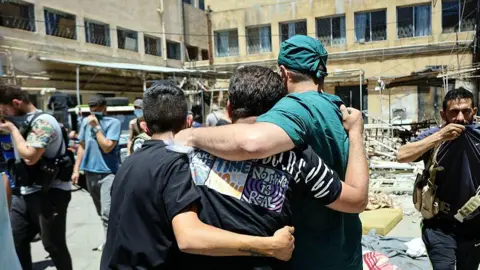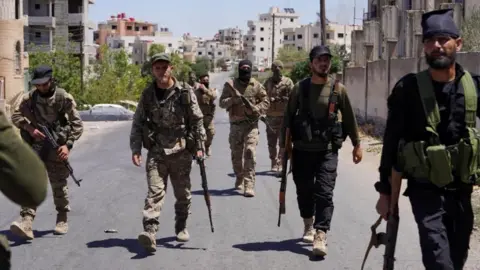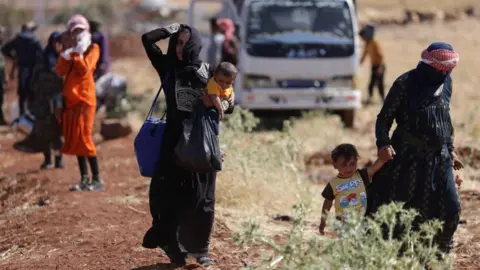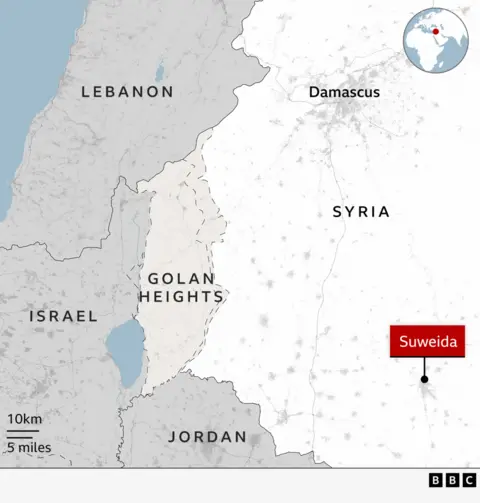 AFP
AFPOver the last five days, Rima says she has witnessed “barbaric” scenes.
The 45-year-old Druze woman has lived in the southern Syrian city of Suweida her whole life, and never thought her once-peaceful hometown would become the scene of a bloodbath.
“There were bodies everywhere outside our building,” she told the BBC in a phone interview, using a pseudonym out of fear for her safety.
Rima said she huddled inside her home, bracing for the unimaginable, as gunmen – government forces and foreign fighters – moved through her neighbourhood earlier this week, going door-to-door looking for their next victim.
“One of the worst feelings ever is to keep waiting for people to come into your house and decide whether we should live or die,” she recalled, her voice still trembling with fear.
The violence has left Rima and her neighbours feeling abandoned and afraid in their own homes, as bullets and shells sounded off outside.
Long-running tensions between Druze and Bedouin tribes in Suweida erupted into deadly sectarian clashes on Sunday, following the abduction of a Druze merchant on the highway to the capital, Damascus.
As the fighting spread to other parts of the southern province, the government of interim President Ahmed al-Sharaa – who led the overthrow of Bashar al-Assad’s regime by Islamist-led rebels in December – announced that it would deploy the interior and defence ministry’s forces to “restore stability”.
Since the fall of Assad, some local Druze leaders have rejected the presence of the security forces in Suweida city. When government forces were deployed on Tuesday, the fighting escalated.
Soon, the government’s forces were being accused of attacking both Druze fighters and civilians, which prompted the Israeli military to intervene with a series of air strikes that it said were intended to protect the Druze.
As Rima watched this play out, the lack of internet and power made it difficult to keep up with the unfolding events. All she knew for sure was what she could see from her window: slaughtered bodies and burned buildings.
Syrian state media have also cited authorities and Bedouin tribes as saying that “outlaw groups” carried out “massacres” and other crimes against Bedouin fighters and civilians.
The Syrian Observatory for Human Rights, a UK-based monitoring group, has said it has documented the killing of at least 594 people since Sunday, including 154 Druze civilians, of whom 83 were summarily killed by government forces, and three members of Bedouin tribes who were summarily killed by Druze fighters.
 Reuters
ReutersNayef, a Druze man whose name we have also changed, was also confronted with horrific scenes in Suweida.
“We are collecting bodies from the streets. We found bodies left outside houses, next to houses for two or three days,” he told the BBC in a phone interview.
Despite being a government employee, Nayef lashed out in disbelief at what he saw as the government forces’ brutality inside the city.
“They stormed neighbourhoods, selecting the houses that look wealthy. They looted these houses and then torched them. They sprayed unarmed civilians with bullets.”
Videos circulating on social media appeared to support Nayef’s allegations.
Footage shared on Facebook on Wednesday afternoon shows at least half-a-dozen men dressed in camouflage firing live rounds at a group of residents, who are kneeling on the sidewalk.
The UN human rights office said it had documented the killing of at least 13 people on Tuesday by armed men affiliated with the government who deliberately opened fire at a family gathering. On the same day, they reportedly summarily executed six men near their homes.
While bullets and shells rained down, Suweida residents were left wondering when help was coming.
But it never came.
Rima said she watched as security forces and foreign fighters entered her neighbourhood and later shot her neighbour in front of his mother.
“Is this the army and security forces who were supposed to come and protect us?” she asked. “People’s livelihoods were stolen. Those who were killed were young and unarmed.”
Other testimony we heard backed up Rima’s claim. Those we spoke to said most of the fighters who entered Suweida and attacked civilians appeared to be Islamists.
One woman heard the fighters shouting “Allahu Akbar” (God is greatest) in her building, calling the Druze “infidels” and “pigs”, and saying they were there to kill them.
Some of these fighters posted videos of themselves online humiliating men in Suweida, including cutting or shaving off the moustaches of Druze sheikhs. The moustaches are a symbol of Druze religious identity.
The BBC has approached the Syrian government for official comments on the issue but not so far received a response.
In a televised address early on Thursday, Sharaa vowed to hold the perpetrators accountable and promised to make protecting the Druze a “priority”.
“We are eager to hold accountable those who transgressed and abused our Druze people because they are under the protection and responsibility of the state,” he said.
He went on to blame “outlaw groups”, saying their leaders “rejected dialogue for many months”.
 Reuters
ReutersFor many, the promise of protection felt like déjà vu.
It resembled the message the president delivered when government forces and allied Islamist fighters carried out deadly reprisals against civilians from another religious minority, the Alawites, in response to attacks by Assad loyalists in the coastal region in March.
A committee was established to investigate those violations – but is yet to deliver any findings.
The accounts from Nayef and others bore many similarities to what happened on the coast in March.
“There’s a total lack of trust with the government,” Nayef said. “They are just doing a lip-service. They say nice things about freedoms, documenting violations and accountability, but they are all lies.”
Many Suweida residents say this latest episode of sectarian violence will have long-lasting effects.
“If it was not for Israel’s bombardment, we wouldn’t be able to talk to you today,” one woman told the BBC.
However, some were also critical of Israel’s airstrikes and its claim that it was acting to protect the Druze.
Nayef said: “Nobody wants Israel. We are patriotic people. We were at the forefront of people to adopt patriotism. Our loyalty and patriotism should not be doubted.”
Additional reporting by Samantha Granville in Beirut


